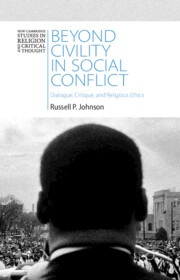Book contents
- Beyond Civility in Social Conflict
- Reviews
- Series page
- Beyond Civility in Social Conflict
- Copyright page
- Dedication
- Contents
- Acknowledgments
- Introduction
- 1 The Three Voices in the Ethics of Communication
- 2 The Rules Are Broken: Dilemmas of Restraint in War and Social Conflict
- 3 Integral Communication
- 4 Illusions and Indirect Communication
- 5 “Dynamically Aggressive”
- 6 Sharing the Good News
- Bibliography
- Index
3 - Integral Communication
Published online by Cambridge University Press: 08 November 2024
- Beyond Civility in Social Conflict
- Reviews
- Series page
- Beyond Civility in Social Conflict
- Copyright page
- Dedication
- Contents
- Acknowledgments
- Introduction
- 1 The Three Voices in the Ethics of Communication
- 2 The Rules Are Broken: Dilemmas of Restraint in War and Social Conflict
- 3 Integral Communication
- 4 Illusions and Indirect Communication
- 5 “Dynamically Aggressive”
- 6 Sharing the Good News
- Bibliography
- Index
Summary
Since the rules of civility are often abandoned for the sake of the goals activists are pursuing, this chapter considers whether these goals – rather than a set of universal rules – might themselves suggest moral constraints. To illustrate this point, I analyze two authors who believe that how one communicates is integrally related to what one actually conveys, and thus morality and effectiveness cannot always be separated. Karlyn Kohrs Campbell argues women must be free to reflect on their own experiences rather than being subjected to authoritative interpretations. Even when done in the name of women’s liberation, telling women how they should feel ironically stifles women’s voices. Thus, a dialogical, consciousness-raising style of communication is integrally related to the pursuit of women’s liberation. Paulo Freire likewise argues that propaganda for the cause of liberation ironically perpetuates oppression. Liberators need to be committed to dialogue because the task of liberation itself demands dialogical engagement.
Keywords
- Type
- Chapter
- Information
- Beyond Civility in Social ConflictDialogue, Critique, and Religious Ethics, pp. 127 - 164Publisher: Cambridge University PressPrint publication year: 2024

